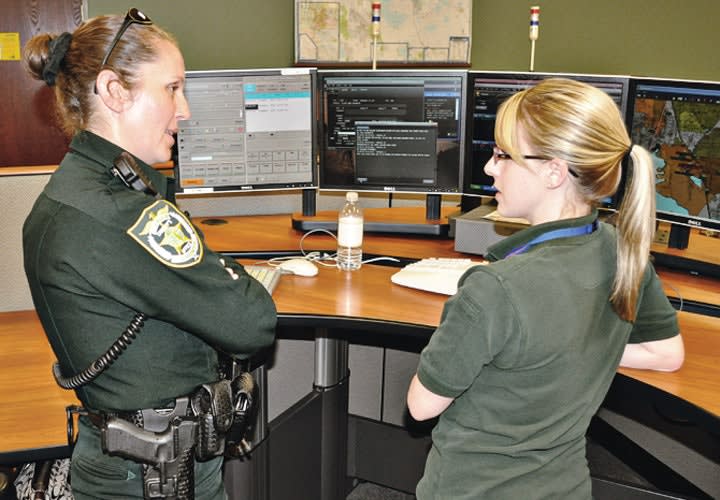Within your first year, however, your experiences tell you that things are not exactly like what your academy instructors said they would be. During your first few days at your agency, you hear words like family to describe your new workplace. And yet somehow, the word dysfunctional is omitted.
When you first become a cop, everyone tells you, you can make a difference. As you leap into your new profession, you have a sense that the people you will be working with will share your values, your goals, and your desire to protect and serve.
Within your first year, however, your experiences tell you that things are not exactly like what your academy instructors said they would be. During your first few days at your agency, you hear words like family to describe your new workplace. And yet somehow, the word dysfunctional is omitted.
I'm not talking about certain elitist tendencies or the favoritism associated with "golden child" syndrome. I'm referring to the friction generated between the different divisions of your agency. It reminds me of high school; only this time, it's not how the jocks treat the geeks, but how one division views another. A classic example is the tumultuous relationship often found between road patrol and communications (dispatch).
See if this exchange doesn't sound vaguely familiar:
Dispatch: "Last Unit, say again, I had background."
Officer (to another officer): "Damn, can she put the Avon catalog down long enough to pay attention? All she does is sit on her ass and gossip all day long with her friends."
Officer: "Dispatch, can you ask if there are any other weapons in the house?"
Dispatch (to another dispatcher): "If I knew that, I would have told him already; can't he just go to the damn call? All he does is sit on his ass all day long in an air-conditioned car and talk with his friends on the phone."
The reality is that both the road officer and the dispatcher are intertwined in a symbiotic relationship where you can't have one without the other. I can argue both sides equally well, as I am married to a former dispatcher who has worked at the county and state levels. Dinner at my house has included some work-related conversations that have been, how can I put it mildly...interesting.
A Mile in Their Shoes
I recently polled a group of communications officers and their supervisors. And I received some very candid and insightful responses. Remembering that perception is reality, I'd like to list some of the more salient points. If any of it applies to you, then maybe understanding both sides of the issue will help you create a middle ground where everyone benefits.
A communications manager with an agency that employs close to 500 sworn officers says, "Field units often discredit telecommunicators due to their support role. A telecommunicator's job is not just about relaying information anymore. There is a technology overload, which means more work for the telecommunicator who now manages more resources, systems, and databases at once, in addition to the traditional business and emergency phone lines."
This dispatch supervisor made me realize that managing information and officer requests is often as complicated as handling in-progress calls in the field. "Officers in the field handle one call at a time," she explains. "They can focus all of their attention on their immediate needs. Field supervisors can delegate, assign, and ask for other assistance. Telecommunicators don't share that luxury. They handle multiple calls at once in addition to officers' demands for assistance and information. Everyone on that channel calls in to speak with just one telecommunicator."
I also received a lot of feedback from individual communicators. The main voice, however, comes from one particular senior operator whose in-depth responses seemed to summarize everyone else's. I have always appreciated her candor and honesty.
Here's what she had to say:[PAGEBREAK]
One officer's negative interaction transmits itself to another officer, especially during initial training. By the end, the young officers mirror their training officers.
Tone is often misunderstood by both sides since we can't see each other when we talk. Do not read too much into it.
Field units believe they are above us because they are out in the field and we are in an office setting. But our stress is just as real as theirs.
I don't take things personally so why should you? If you insult me over the radio with a snide comment, that's a different story.
I can't care more about your life than you do. If you don't check out on the radio, how can I send you backup when you scream for help?
We don't intentionally give out bad information.
We understand you deal with crazy people; we do it all day long; just over the phone.
Give us credit for all the calls we take care of that you never see.
I'm cussing at you just as much as you are cussing at me.
Listen to the radio and stop asking for the same thing your zone partner just did.
The instantaneous society we live in now puts unrealistic expectations on us. Not everything you ask for can get done in 30 seconds.
When you visit, you'll witness down times. But that doesn't mean we spend the day doing nothing. It's no different than us thinking all you do is drive around ducking calls.
Please don't send an officer up here as discipline; what does that say about us?
Creating Middle Ground
Instead of fighting with each other, we should be helping each other. By understanding what role we each play, we can create middle ground. When I was invited to give our Communications Section a class on the Road Patrol perspective, I jumped on the chance. I wanted to explain the how and why of what we do. I wanted them to understand what I needed as a Watch Commander. I also wanted to learn what they needed from me.
I explained how the road handled in-progress calls. I went through a mini-FTO program, including setting up perimeters, deploying K-9 assets, and how to use aviation. I talked about why we ask the questions that we do. One example I covered was weapon type. You can't throw a knife as far as rifle bullet travels so that information speaks to my approach and officer deployment. I stressed that I had to formulate a response based on the information they gave. Good information, good decisions; bad information, bad decisions. I also explained that I understood that they can only feed me what they have.
I answered many of their questions, and because of this open forum, they had many "I never thought of it that way" moments. It wasn't all peaches and cream for me, however; I had several of those moments myself.
Before I go running my mouth, I try to understand the other person's point of view. It's a fundamental concept in negotiating and problem solving for a road patrol supervisor. Whenever I observed an officer give dispatch a hard time, I sent him or her to work a shift alongside that communications officer. I made these officers walk a mile in the other person's shoes.
Usually after a couple of shifts, these officers saw for themselves what really went on behind the scenes. For example, they heard other officers show their ass and observed the frustration it caused.
When I first became a sergeant, a dispatcher got annoyed with me over the radio. I had asked what type of firearm was involved and was looking for whether it was a handgun or rifle. She responded back with an attitude and blew me off. She never did bother to find out. I later heard that she went on a rant about my always asking stupid questions and that I should just go to the call and find out for myself. Needless to say that didn't sit well with me.
I got with her supervisor and made arrangements for her to ride with me. Luckily when she did, we had a similar type of in-progress call involving weapons. Now that she was in the car, and her ass was on the line, the questions didn't seem so stupid.
It became obvious to her it's important to know what you are up against so you can plan accordingly. Later on she was very shocked when she heard the tone and attitude in some of her co-workers' voices. As I was taking a sip of coffee, she asked me if she ever sounded like that. When I almost spit my coffee out, she understood that to be a resounding "yes." We had a nice, long talk and things got better after that. Amazing how that "walk in someone else's shoes" thing can work.
It's understandable that our assignments and missions cause us to focus on our responsibilities. In this case, telecommunicators are about information and field units are about taking action. However, that doesn't mean we can't work together and help each other achieve a better outcome. At the end of the day, we may be in separate divisions but we are still in the same agency, trying to achieving the same goals. You may very well be in the field, but I can assure you, that a communications officer is right there next to you. If you don't believe me, ask one who was on the radio during a shooting.
Amaury Murgado is a special operations lieutenant with the Osceola County (Fla.) Sheriff's Office. He is a retired master sergeant from the Army Reserve, has 24 years of law enforcement experience, and has been involved with martial arts for 38 years.












